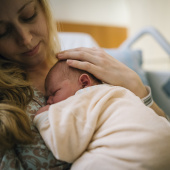What are the early signs of pregnancy and what should you do after a positive pregnancy test? Find out about symptoms and next steps in the first trimester.
The following could be early indicators of pregnancy before it’s time to do a pregnancy test. You may not notice all or any of them (NHS, 2022a).
Missed period
A missed period is the most reliable early sign of pregnancy. Light bleeding or spotting, called implantation bleeding, can happen in early pregnancy (NHS, 2022a).
Feeling sick (nauseous) or being sick
Nausea and vomiting are common signs of early pregnancy. More than half of pregnant women and people experience these symptoms (Matthews et al, 2024). It’s often called ‘morning sickness’ but can happen at any time during the day (NHS, 2022a).
Feelings of sickness have gone away in 9 out of 10 cases by week 20 of the pregnancy. If the sickness is extreme, it could be a condition called hyperemesis gravidarum or HG. Get help from a GP if the nausea or vomiting is severe.
Other early signs of pregnancy could be:
- Tiredness and emotional upset caused by hormonal changes in the first trimester of pregnancy.
- Breasts becoming larger and tender.
- An increased need to wee, especially at night.
- Constipation.
- Increased vaginal lubrication.
- A metallic taste in the mouth.
- Loss of interest in foods previously enjoyed, like tea, coffee or fatty food.
- Craving foods.
- Sensitivity to common smells, eg cooking.
(NHS, 2022a)
Doing a pregnancy test
A pregnancy test can be taken at home from the first day of a missed period. If you are unsure when that was, wait at least 21 days (about 3 weeks) after having unprotected sex or intrauterine insemination. Some very sensitive tests can give a positive result before this (NHS, 2022b).
Pharmacies and some supermarkets sell pregnancy tests, or you should be able to get them for free from your GP (NHS, 2022b).
Doing a test at home is a reliable way of confirming a pregnancy. A positive result should be very accurate (NHS, 2022b).
However, a negative result is not always as certain. If there are signs of pregnancy but the test result is negative, wait a few days and do the test again (NHS, 2022b).
There is a small possibility of getting pregnant even if you’re using contraception (NHS, 2022b). If you’re using contraception but there are signs of pregnancy, you could do a test to find out.
You’re pregnant – what next?
If you want to continue with the pregnancy, contact your GP or midwife. They will want to see you as soon as possible to offer screening tests and information about how to stay healthy. You can self-refer to a midwife without seeing a GP if you like (NHS, 2022b; NHS 2023a).
Look around for what antenatal support is available locally, including our antenatal courses and branch support.
If you or your partner (if you have one) are unsure about continuing the pregnancy, the pregnant woman or person can talk to their GP or nurse. They can have this conversation privately at their GP surgery (NHS, 2022b). You can also get information and support from sexual health services including MSI Reproductive Choices, the British Pregnancy Advisory Service or the National Unplanned Pregnancy Advisory Service.
Looking after the pregnant woman and baby
There are things the pregnant woman or person can do from the early days for the best chance of having a healthy pregnancy (NHS, 2023b):
Folic acid
Take a folic acid supplement if planning a pregnancy. If it hasn’t been taken before the pregnancy, then just start taking it every day until 12 weeks pregnant. Folic acid reduces the chance of your baby having a neural tube defect such as spina bifida.
Smoking
Smoking is linked to premature birth, low birth weight, Sudden Infant Death Syndrome (SIDS) and miscarriage. NHS Quit Smoking provides tools to support you to stop.
Alcohol
Drinking alcohol while pregnant can cause harm to the baby, so the pregnant woman or person could cut down or avoid alcohol. Find out more about drinking alcohol while pregnant.
Diet and exercise
Having a healthy diet and doing moderate exercise will help maintain a healthy weight. Look at our tips for eating healthily.
Vaccinations
Some infections, such as rubella or German measles, can harm the baby if the parent catches them in pregnancy. Talk to your GP if you're pregnant and you haven't had the MMR (measles, mumps and rubella) vaccination, and about other vaccinations.
Medicine and health conditions
A pharmacist will be able to tell you which over the counter medications are safe to take when pregnant or planning a pregnancy.
Talk to the GP if you have a long term health condition, such as diabetes or epilepsy, or a mental health condition. Don’t stop taking any medication already being taken without speaking to a doctor first.
You might want to request a free test from the GP or local centre for inherited blood disorders such as sickle cell or thalassaemia.
Screening tests
The pregnant woman or person will be offered screening tests to check and assess the wellbeing of the baby. Read more about them.
Further information
Our antenatal courses can help you find out more about pregnancy, birth, labour and life with a baby. We have lots of information about pregnancy on our website.
Matthews A, Haas DM, O'Mathúna DP, Dowswell T. (2015) Interventions for nausea and vomiting in early pregnancy. Cochrane Database of Systematic Reviews, 9. CD007575. https://doi.org/10.1002/14651858.CD007575.pub4 [24 Aug 24]
NHS (2022a) Signs and symptoms of pregnancy. https://www.nhs.uk/pregnancy/trying-for-a-baby/signs-and-symptoms-of-pr… [24 Aug 24]
NHS (2022b) Doing a pregnancy test. https://www.nhs.uk/pregnancy/trying-for-a-baby/doing-a-pregnancy-test/ [24 Aug 24]
NHS (2023a) Antenatal care. https://www.nhs.uk/pregnancy/your-pregnancy-care/your-antenatal-care/ [29 Aug 24]
NHS (2023b) Planning your pregnancy. https://www.nhs.uk/pregnancy/trying-for-a-baby/planning-your-pregnancy/ [24 Aug 24]






